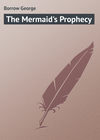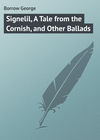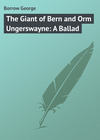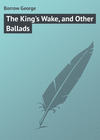Loe raamatut: «Wild Wales: The People, Language, & Scenery», lehekülg 28
“Another time when I was at Chester I lifted a barrel of porter from the street to the hinder part of the waggon, solely by strength of back and arms.”
He was once run over by a loaded waggon, but, strange to say, escaped without the slightest injury.
Towards the close of his life he had strong religious convictions, and felt a loathing for the sins which he had committed. “On their account,” says he, in the concluding page of his biography, “there is a strong necessity for me to consider my ways, and to inquire about a Saviour, since it is utterly impossible for me to save myself without obtaining knowledge of the merits of the Mediator, in which I hope I shall terminate my short time on earth in the peace of God enduring unto all eternity.”
He died in the year 1810, at the age of 71, shortly after the death of his wife, who seems to have been a faithful, loving partner. By her side he was buried in the earth of the graveyard of the White Church, near Denbigh. There can be little doubt that the souls of both will be accepted on the great day when, as Gronwy Owen says: —
“Like corn from the belly of the ploughed field, in a thick crop, those buried in the earth shall arise, and the sea shall cast forth a thousand myriads of dead above the deep billowy way.”
CHAPTER LX
Mystery Plays – The Two Prime Opponents – Analysis of Interlude – “Riches and Poverty” – Tom’s Grand Qualities.
In the preceding chapter I have given an abstract of the life of Tom O’ the Dingle; I will now give an analysis of his interlude; first, however, a few words on interludes in general. It is difficult to say, with anything like certainty, what is the meaning of the word interlude. It may mean, as Warton supposes in his history of English Poetry, a short play performed between the courses of a banquet, or festival; or it may mean the playing of something by two or more parties, the interchange of playing or acting which occurs when two or more people act. It was about the middle of the fifteenth century that dramatic pieces began in England to be called Interludes; for some time previous they had been styled Moralities; but the earliest name by which they were known was Mysteries. The first Mysteries composed in England were by one Ranald, or Ranulf, a monk of Chester, who flourished about 1322, whose verses are mentioned rather irreverently in one of the visions of Piers Plowman, who puts them in the same rank as the ballads about Robin Hood and Maid Marion, making Sloth say:
“I cannot perfitly my Paternoster as the priest it singeth,
But I can rhymes of Robin Hood and Ranald of Chester.”
Long, however, before the time of this Ranald, Mysteries had been composed and represented both in Italy and France. The Mysteries were very rude compositions; little more, as Warton says, than literal representations of portions of Scripture. They derived their name of Mysteries from being generally founded on the more mysterious parts of Holy Writ – for example, the Incarnation, the Atonement and the Resurrection. The Moralities displayed something more of art and invention than the Mysteries; in them virtues, vices and qualities were personified, and something like a plot was frequently to be discovered. They were termed Moralities because each had its moral, which was spoken at the end of the piece by a person called the Doctor. 6 Much that has been said about the moralities holds good with respect to the interludes. Indeed, for some time dramatic pieces were called moralities and interludes indifferently. In both there is a mixture of allegory and reality. The latter interludes, however, display more of everyday life than was ever observable in the moralities, and more closely approximate to modern plays. Several writers of genius have written interludes, amongst whom are the English Skelton and the Scottish Lindsay, the latter of whom wrote eight pieces of that kind, the most celebrated of which is called “The Puir Man and the Pardonar.” Both of these writers flourished about the same period, and made use of the interlude as a means of satirising the vices of the popish clergy. In the time of Charles the First the interlude went much out of fashion in England; in fact, the play, or regular drama, had superseded it. In Wales, however, it continued to the beginning of the present century, when it yielded to the influence of Methodism. Of all Welsh interlude composers, Twm O’r Nant, or Tom of the Dingle, was the most famous. Here follows the promised analysis of his “Riches and Poverty.”
The entire title of the interlude is to this effect. The two prime opponents Riches and Poverty. A brief exposition of their contrary effects on the world; with short and appropriate explanations of their quality and substance, according to the rule of the four elements, Water, Fire, Earth, and Air.
First of all enter Fool, Sir Jemant Wamal, who in rather a foolish speech tells the audience that they are about to hear a piece composed by Tom the poet. Then appears Captain Riches, who makes a long speech about his influence in the world, and the general contempt in which Poverty is held; he is, however, presently checked by the Fool, who tells him some home truths, and asks him, among other questions, whether Solomon did not say that it is not meet to despise a poor man, who conducts himself rationally. Then appears Howel Tightbelly, the miser, who in capital verse, with very considerable glee and exultation, gives an account of his manifold rascalities. Then comes his wife, Esther Steady, home from the market, between whom and her husband there is a pithy dialogue. Captain Riches and Captain Poverty then meet, without rancour, however, and have a long discourse about the providence of God, whose agents they own themselves to be. Enter then an old worthless scoundrel called Diogyn Trwstan, or Luckless Lazybones, who is upon the parish, and who, in a very entertaining account of his life, confesses that he was never good for anything, but was a liar and an idler from his infancy. Enter again the Miser along with poor Lowry, who asks the Miser for meal, and other articles, but gets nothing but threatening language. There is then a very edifying dialogue between Mr. Contemplation and Mr. Truth, who, when they retire, are succeeded on the stage by the Miser and John the Tavern-keeper. The publican owes the Miser money, and begs that he will be merciful to him. The Miser, however, swears that he will be satisfied with nothing but bond and judgment on his effects. The publican very humbly says that he will go to a friend of his, in order to get the bond made out; almost instantly comes the Fool, who reads an inventory of the publican’s effects. The Miser then sings for very gladness, because everything in the world has hitherto gone well with him; turning round, however, what is his horror and astonishment to behold Mr. Death, close by him. Death hauls the Miser away, and then appears the Fool to moralise and dismiss the audience.
The appropriate explanations mentioned in the title are given in various songs which the various characters sing after describing themselves, or after dialogues with each other. The announcement that the whole exposition, etc., will be after the rule of the four elements, is rather startling; the dialogue, however, between Captain Riches and Captain Poverty shows that Tom was equal to his subject, and promised nothing that he could not perform.
Enter Captain Poverty
O Riches, thy figure is charming and bright,
And to speak in thy praise all the world doth delight,
But I’m a poor fellow all tatter’d and torn,
Whom all the world treateth with insult and scorn.
Riches
However mistaken the judgment may be
Of the world which is never from ignorance free,
The parts we must play, which to us are assign’d,
According as God has enlighten’d our mind.
Of elements four did our Master create,
The earth and all in it with skill the most great;
Need I the world’s four materials declare —
Are they not water, fire, earth, and air?
Too wise was the mighty Creator to frame
A world from one element, water or flame;
The one is full moist and the other full hot,
And a world made of either were useless, I wot.
And if it had all of mere earth been compos’d,
And no water nor fire been within it enclos’d,
It could ne’er have produc’d for a huge multitude
Of all kinds of living things suitable food.
And if God what was wanted had not fully known,
But created the world of these three things alone,
How would any creature the heaven beneath,
Without the blest air have been able to breathe?
Thus all things created, the God of all grace,
Of four prime materials, each good in its place.
The work of His hands, when completed, He view’d,
And saw and pronounc’d that ’twas seemly and good.
Poverty
In the marvellous things, which to me thou hast told
The wisdom of God I most clearly behold,
And did He not also make man of the same
Materials He us’d when the world He did frame?
Riches
Creation is all, as the sages agree,
Of the elements four in man’s body that be;
Water’s the blood, and fire is the nature
Which prompts generation in every creature.
The earth is the flesh which with beauty is rife,
The air is the breath, without which is no life;
So man must be always accounted the same
As the substances four which exist in his frame.
And as in their creation distinction there’s none
’Twixt man and the world, so the Infinite One
Unto man a clear wisdom did bounteously give
The nature of everything to perceive.
Poverty
But one thing to me passing strange doth appear:
Since the wisdom of man is so bright and so clear,
How comes there such jarring and warring to be
In the world betwixt Riches and Poverty?
Riches
That point we’ll discuss without passion or fear
With the aim of instructing the listeners here;
And haply some few who instruction require
May profit derive like the bee from the briar.
Man as thou knowest, in his generation
Is a type of the world and of all the creation;
Difference there’s none in the manner of birth
’Twixt the lowliest hinds and the lords of the earth.
The world which the same thing as man we account
In one place is sea, in another is mount;
A part of it rock, and a part of it dale —
God’s wisdom has made every place to avail.
There exist precious treasures of every kind
Profoundly in earth’s quiet bosom enshrin’d;
There’s searching about them, and ever has been,
And by some they are found, and by some never seen.
With wonderful wisdom the Lord God on high
Has contriv’d the two lights which exist in the sky;
The sun’s hot as fire, and its ray bright as gold,
But the moon’s ever pale, and by nature is cold.
The sun, which resembles a huge world of fire,
Would burn up full quickly creation entire
Save the moon with its temp’rament cool did assuage
Of its brighter companion the fury and rage.
Now I beg you the sun and the moon to behold,
The one that’s so bright, and the other so cold,
And say if two things in creation there be
Better emblems of Riches and Poverty.
Poverty
In manner most brief, yet convincing and clear,
You have told the whole truth to my wond’ring ear,
And I see that ’twas God, who in all things is fair,
Has assign’d us the forms, in this world which we bear.
In the sight of the world doth the wealthy man seem
Like the sun which doth warm everything with its beam;
Whilst the poor needy wight with his pitiable case
Resembles the moon which doth chill with its face.
Riches
You know that full oft, in their course as they run,
An eclipse cometh over the moon or the sun;
Certain hills of the earth with their summits of pride
The face of the one from the other do hide.
The sun doth uplift his magnificent head,
And illumines the moon, which were otherwise dead,
Even as Wealth from its station on high,
Giveth work and provision to Poverty.
Poverty
I know, and the thought mighty sorrow instils,
The sins of the world are the terrible hills
An eclipse which do cause, or a dread obscuration,
To one or another in every vocation.
Riches
It is true that God gives unto each from his birth
Some task to perform whilst he wends upon earth,
But He gives correspondent wisdom and force
To the weight of the task, and the length of the course.
[Exit.
Poverty
I hope there are some, who ’twixt me and the youth
Have heard this discourse, whose sole aim is the truth,
Will see and acknowledge, as homeward they plod,
Each thing is arrang’d by the wisdom of God.
There can be no doubt that Tom was a poet, or he could never have treated the hackneyed subjects of Riches and Poverty in a manner so original, and at the same time so masterly, as he has done in the interlude above analysed; I cannot, however, help thinking that he was greater as a man than a poet, and that his fame depends more on the cleverness, courage and energy, which it is evident by his biography that he possessed, than on his interludes. A time will come when his interludes will cease to be read, but his making ink out of elderberries, his battle with the “cruel fighter,” his teaching his horses to turn the crane, and his getting the ship to the water, will be talked of in Wales till the peak of Snowdon shall fall down.
CHAPTER LXI
Set out for Wrexham – Craig y Forwyn – Uncertainty – The Collier – Cadogan Hall – Methodistical Volume.
Having learnt from a newspaper that a Welsh book on Welsh Methodism had been just published at Wrexham, I determined to walk to that place and purchase it. I could easily have procured the work through a bookseller at Llangollen, but I wished to explore the hill-road which led to Wrexham, what the farmer under the Eglwysig rocks had said of its wildness having excited my curiosity, which the procuring of the book afforded me a plausible excuse for gratifying. If one wants to take any particular walk, it is always well to have some business, however trifling, to transact at the end of it; so having determined to go to Wrexham by the mountain road, I set out on the Saturday next after the one on which I had met the farmer who had told me of it.
The day was gloomy, with some tendency to rain. I passed under the hill of Dinas Bran. About a furlong from its western base I turned round and surveyed it – and perhaps the best view of the noble mountain is to be obtained from the place where I turned round. How grand, though sad, from there it looked, that grey morning, with its fine ruin on its brow, above which a little cloud hovered! It put me in mind of some old king, unfortunate and melancholy, but a king still, with the look of a king, and the ancestral crown still on his furrowed forehead. I proceeded on my way, all was wild and solitary, and the yellow leaves were falling from the trees of the groves. I passed by the farmyard, where I had held discourse with the farmer on the preceding Saturday, and soon entered the glen, the appearance of which had so much attracted my curiosity. A torrent, rushing down from the north, was on my right. It soon began to drizzle, and mist so filled the glen that I could only distinguish objects a short way before me, and on either side. I wandered on a considerable way, crossing the torrent several times by rustic bridges. I passed two lone farm-houses, and at last saw another on my left hand – the mist had now cleared up, but it still slightly rained – the scenery was wild to a degree – a little way before me was a tremendous pass, near it an enormous crag, of a strange form, rising to the very heavens, the upper part of it of a dull white colour. Seeing a respectable-looking man near the house, I went up to him. “Am I in the right way to Wrexham?” said I, addressing him in English.
“You can get to Wrexham this way, sir,” he replied.
“Can you tell me the name of that crag?” said I, pointing to the large one.
“That crag, sir, is called Craig y Forwyn.”
“The maiden’s crag,” said I; “why is it called so?”
“I do not know, sir; some people say that it is called so because its head is like that of a woman, others because a young girl in love leaped from the top of it and was killed.”
“And what is the name of this house?” said I.
“This house, sir, is called Plas Uchaf.”
“Is it called Plas Uchaf,” said I, “because it is the highest house in the valley?”
“It is, sir; it is the highest of three homesteads; the next below it is Plas Canol – and the one below that Plas Isaf.”
“Middle place and lower place,” said I. “It is very odd that I know in England three people who derive their names from places so situated. One is Houghton, another Middleton, and the third Lowdon; in modern English, Hightown, Middletown, and Lowtown.”
“You appear to be a person of great intelligence, sir.”
“No, I am not – but I am rather fond of analysing words, particularly the names of persons and places. Is the road to Wrexham hard to find?”
“Not very, sir; that is, in the day-time. Do you live at Wrexham?”
“No,” I replied, “I am stopping at Llangollen.”
“But you won’t return there to-night?”
“O yes, I shall!”
“By this road?”
“No, by the common road. This is not a road to travel by night.”
“Nor is the common road, sir, for a respectable person on foot; that is, on a Saturday night. You will perhaps meet drunken colliers, who may knock you down.”
“I will take my chance for that,” said I, and bade him farewell. I entered the pass, passing under the strange-looking crag. After I had walked about half-a-mile the pass widened considerably, and a little way farther on debouched on some wild, moory ground. Here the road became very indistinct. At length I stopped in a state of uncertainty. A well-defined path presented itself, leading to the east, whilst northward before me there seemed scarcely any path at all. After some hesitation I turned to the east by the well-defined path, and by so doing went wrong, as I soon found.
I mounted the side of a brown hill covered with moss-like grass, and here and there heather. By the time I arrived at the top of the hill the sun shone out, and I saw Rhiwabon and Cefn Mawr before me in the distance. “I am going wrong,” said I; “I should have kept on due north. However, I will not go back, but will steeplechase it across the country to Wrexham, which must be towards the north-east.” So turning aside from the path, I dashed across the hills in that direction; sometimes the heather was up to my knees, and sometimes I was up to the knees in quags. At length I came to a deep ravine, which I descended; at the bottom was a quagmire, which, however, I contrived to cross by means of certain stepping-stones, and came to a cart-path up a heathery hill, which I followed. I soon reached the top of the hill, and the path still continuing, I followed it till I saw some small grimy-looking huts, which I supposed were those of colliers. At the door of the first I saw a girl. I spoke to her in Welsh, and found she had little or none. I passed on, and seeing the door of a cabin open, I looked in – and saw no adult person, but several grimy but chubby children. I spoke to them in English, and found they could only speak Welsh. Presently I observed a robust woman advancing towards me; she was barefooted, and bore on her head an immense lump of coal. I spoke to her in Welsh, and found she could only speak English. “Truly,” said I to myself, “I am on the borders. What a mixture of races and languages!” The next person I met was a man in a collier’s dress; he was a stout-built fellow of the middle age, with a coal-dusty, surly countenance. I asked him in Welsh if I was in the right direction for Wrexham, he answered in a surly manner in English that I was. I again spoke to him in Welsh, making some indifferent observation on the weather, and he answered in English yet more gruffly than before. For the third time I spoke to him in Welsh, whereupon, looking at me with a grin of savage contempt, and showing a set of teeth like those of a mastiff, he said, “How’s this? why, you haven’t a word of English! A pretty fellow, you, with a long coat on your back, and no English on your tongue; an’t you ashamed of yourself? Why, here am I in a short coat, yet I’d have you to know that I can speak English as well as Welsh, aye, and a good deal better.” “All people are not equally clebber,” said I, still speaking Welsh. “Clebber,” said he, “clebber! what is clebber? why can’t you say clever? Why, I never saw such a low, illiterate fellow in my life;” and with these words he turned away, with every mark of disdain, and entered a cottage near at hand.
“Here I have had,” said I to myself, as I proceeded on my way, “to pay for the over-praise which I lately received. The farmer on the other side of the mountain called me a person of great intelligence, which I never pretended to be, and now this collier calls me a low, illiterate fellow, which I really don’t think I am. There is certainly a Nemesis mixed up with the affairs of this world; every good thing which you get, beyond what is strictly your due, is sure to be required from you with a vengeance. A little over-praise by a great deal of under-rating – a gleam of good fortune by a night of misery.”
I now saw Wrexham Church at about the distance of three miles, and presently entered a lane which led gently down from the hills, which were the same heights I had seen on my right hand, some months previously, on my way from Wrexham to Rhiwabon. The scenery now became very pretty – hedge-rows were on either side, a luxuriance of trees, and plenty of green fields. I reached the bottom of the lane, beyond which I saw a strange-looking house upon a slope on the right hand. It was very large, ruinous, and seemingly deserted. A little beyond it was a farm-house, connected with which was a long row of farming buildings along the roadside. Seeing a woman seated knitting at the door of a little cottage, I asked her in English the name of the old ruinous house.
“Cadogan Hall, sir,” she replied.
“And whom does it belong to?” said I.
“I don’t know exactly,” replied the woman, “but Mr. Morris at the farm holds it, and stows his things in it.”
“Can you tell me anything about it?” said I.
“Nothing farther,” said the woman, “than that it is said to be haunted, and to have been a barrack many years ago.”
“Can you speak Welsh?” said I.
“No,” said the woman; “I are Welsh, but have no Welsh language.”
Leaving the woman, I put on my best speed, and in about half-an-hour reached Wrexham.
The first thing I did on my arrival was to go to the bookshop and purchase the Welsh methodistic book. It cost me seven shillings, and was a thick, bulky octavo, with a cut-and-come-again expression about it, which was anything but disagreeable to me, for I hate your flimsy publications. The evening was now beginning to set in, and feeling somewhat hungry, I hurried off to the Wynstay Arms, through streets crowded with market people. On arriving at the inn, I entered the grand room and ordered dinner. The waiters, observing me splashed with mud from head to foot, looked at me dubiously; seeing, however, the respectable-looking volume which I bore in my hand – none of your railroad stuff – they became more assured, and I presently heard one say to the other, “It’s all right – that’s Mr. So-and-so, the great Baptist preacher. He has been preaching amongst the hills – don’t you see his Bible?”
Seating myself at a table, I inspected the volume. And here, perhaps, the reader expects that I shall regale him with an analysis of the methodistical volume at least as long as that of the life of Tom O’ the Dingle. In that case, however, he will be disappointed; all that I shall at present say of it is, that it contained a history of Methodism in Wales, with the lives of the principal Welsh Methodists. That it was fraught with curious and original matter, was written in a straightforward, methodical style, and that I have no doubt it will some day or other be extensively known and highly prized.
After dinner I called for half a pint of wine. Whilst I was trifling over it, a commercial traveller entered into conversation with me. After some time he asked me if I was going further that night.
“To Llangollen,” said I.
“By the ten o’clock train?” said he.
“No,” I replied, “I am going on foot.”
“On foot!” said he; “I would not go on foot there this night for fifty pounds.”
“Why not?” said I.
“For fear of being knocked down by the colliers, who will be all out and drunk.”
“If not more than two attack me,” said I, “I shan’t much mind. With this book I am sure I can knock down one, and I think I can find play for the other with my fists.”
The commercial traveller looked at me. “A strange kind of Baptist minister,” I thought I heard him say.




















